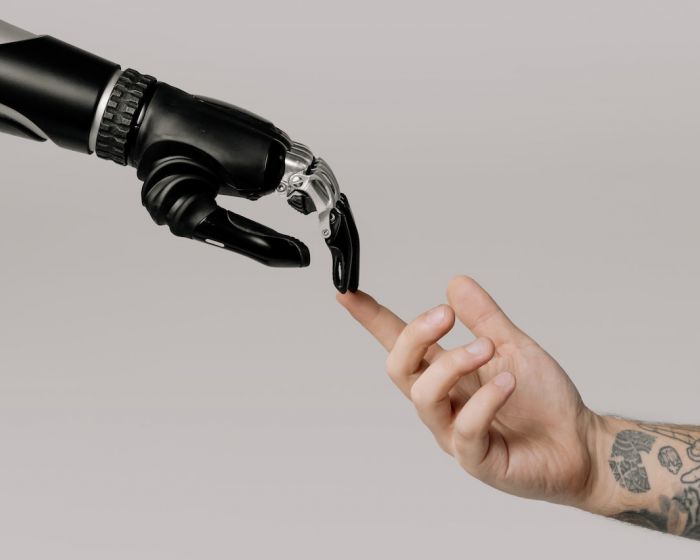Artificial Intelligence (AI) has transformed countless industries, and marketing is no exception.
While many (understandably) remain sceptical about how far it is headed, it is clear that it is a very useful tool indeed. Marketers can use it to:
Better understand consumers
Personalise experiences
Streamline operations
Enhance decision-making processes
AI’s influence on modern marketing techniques cannot be ignored. It has unlocked unprecedented possibilities, enabling brands to be more proactive, accurate and adaptive in how they connect with their audiences.
Below, we take a look at the role of AI in marketing and how it’s shaping today’s strategies:
1. Data-Driven Decision Making
One of the most notable ways that AI has impacted marketing is through its ability to process large amounts of data. AI algorithms have the power to analyse and extract valuable insights from:
Customer behaviour
Demographics
Purchasing history
Marketers can now rely on precise, data-backed decisions, enabling them to understand customer preferences, predict future behaviour, make informed choices and stay ahead of trends.
For example, with predictive analytics, companies can anticipate customer actions and preferences, allowing them to personalise their offerings and boost sales. This data-driven approach enhances customer satisfaction by delivering relevant products and content, improving overall brand loyalty.
2. Personalised Customer Experiences
Today’s consumers expect a personalised experience across every touchpoint with a brand. With AI, marketers can analyse consumer data to personalise interactions on a granular level. Algorithms consider each individual’s behaviour, location, interests and more, enabling companies to provide unique, customised content and recommendations.
For example, Netflix and Amazon use AI to recommend content and products tailored to individual users based on their past interactions. In marketing, this ability to deliver relevant ads, emails and product recommendations significantly increases engagement rates, making customers feel valued and understood by the brand.
3. Enhanced Customer Segmentation
AI has refined customer segmentation, allowing brands to categorise their audiences into detailed groups based on shared behaviours, preferences and demographics. While traditional segmentation might rely on simple factors like age, gender or location, AI-powered segmentation can delve deeper, recognising intricate patterns within customer data.
This enhanced segmentation helps companies craft targeted campaigns for specific audience clusters. This leads to more effective marketing efforts and higher conversion rates. By engaging each segment with tailored content, brands build stronger connections with consumers, resulting in increased brand loyalty and customer retention.
4. Automating Customer Service with Chatbots
Customer service is a crucial aspect of the customer journey, and AI has revolutionised this area through the use of chatbots. AI-powered chatbots can provide 24/7 support, answer common queries and guide customers through the purchasing process. Today’s chatbots are more sophisticated, capable of understanding natural language, detecting sentiment and providing accurate responses.
For instance, many e-commerce platforms use chatbots to assist users with product inquiries, track orders and even facilitate returns.
increases customer satisfaction while reducing the workload for human representatives. It also allows companies to maintain a high level of customer service without significant additional costs.
5. Content Creation and Curation
AI is also transforming content marketing. AI-powered tools can generate content ideas, curate existing content and even write basic articles or social media posts. While AI-generated content may not replace human creativity, it certainly aids in meeting the demand for quick and consistent content.
For example, AI algorithms can analyse trending topics and suggest content ideas based on what’s popular among specific audience segments. Content curation tools powered by AI can gather and recommend relevant articles, images and videos to share with audiences, keeping them engaged without the need for manual searching and selection.
6. Voice Search Optimisation
Voice search is another area where AI is impacting marketing. With the rise of voice-activated assistants like Siri, Alexa and Google Assistant, consumers are increasingly using voice search to find information. This trend requires marketers to adapt their SEO strategies for natural, conversational language that reflects how people speak rather than type.
To optimise for voice search, brands must focus on long-tail keywords, conversational phrases and local SEO tactics. AI-powered tools can help analyse and adapt content to ensure it ranks well for voice queries. Adapting to this trend allows brands to reach a broader audience, especially as voice search becomes more popular on mobile devices.
7. Predictive Analytics and Trend Forecasting
Predictive analytics is a game-changer for marketers. It offers insights that help anticipate consumer needs and preferences. By analysing historical data, AI algorithms can predict future trends, allowing brands to adjust their strategies proactively. Predictive analytics can also:
Identify which products or services are likely to succeed
Optimise inventory management
Forecast sales performance
With the ability to forecast customer needs, marketers can craft campaigns that resonate with their intended audience. For example, predictive analytics might reveal a trend towards sustainable products within a specific demographic, prompting a company to launch environmentally-friendly offerings in their upcoming campaigns.
8. Real-Time Ad Targeting
AI has enabled real-time ad targeting, significantly increasing the effectiveness of digital advertising. Through programmatic advertising, brands can deliver ads to the right audience at the right time, optimising for factors like:
Location
Browsing history
Device type
Behavioural data
AI algorithms determine which ads should be shown to which users, improving the chances of conversion.
This real-time targeting means that ads are less intrusive and more relevant to each user. Moreover, programmatic advertising helps brands get the most out of their ad spend by targeting only those most likely to engage with the ad content.
9. Fraud Detection and Improved Security
As marketing increasingly moves online, security is essential. AI has also impacted fraud detection by identifying anomalies and suspicious activity in real-time, protecting businesses and their customers.
For example, if an unusual purchasing pattern is detected, AI can alert the company to investigate, preventing potential fraud.
For marketers, the assurance of security translates to trust. When customers know that a brand uses advanced security measures, they’re more likely to interact and make purchases online. Enhanced security also benefits the brand’s reputation, further solidifying customer relationships.
10. Improving ROI and Efficiency
AI helps brands improve their return on investment (ROI) by streamlining processes, reducing costs and increasing conversion rates. AI tools automate repetitive tasks, freeing up human resources for more strategic initiatives.
In addition, AI-powered insights help allocate resources effectively by identifying the best-performing marketing channels, campaigns and customer segments.
For example, AI can manage email campaigns, adjust ad budgets based on performance and even recommend content topics that resonate with a specific audience. By maximising efficiency, brands can focus on creating valuable content, enhancing customer experiences and building long-term relationships with their audiences.
Are you using AI for your marketing?
AI has become a vital asset for modern marketing, enhancing personalisation, automation, and data analysis. As AI continues to evolve, it will bring further advancements in customer experience, predictive analytics, and efficient operations.
Marketers who embrace AI will not only streamline their processes but also gain a competitive edge in understanding and serving their customers better. For businesses, leveraging AI’s full potential is essential to adapt and thrive in an increasingly competitive digital world.








